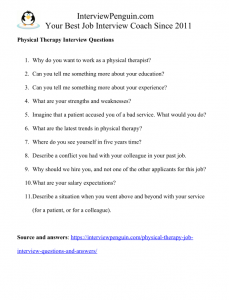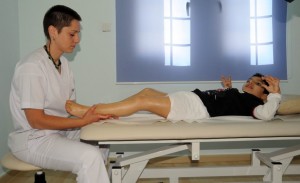What will happen in your interview? Simple as it sounds, hiring managers will try to understand two things. First one, whether you can perform the therapy methods and treatment they use at their rehabilitation center, or their healthcare institution. Secondly, whether you have the right personality for the job, the right attitude to patients and to physiotherapy work. And how good are your chances to get this job? Well, it depends…
Good news is that you will have more chances. Both public and private rehabilitation/physiotherapy centers are being built all around the world right now, and all of them need qualified physical therapists. That also means that you won’t compete with many other people for the job–it is more the center that will fight for good candidates, for people like you. 🙂 Nevertheless, the better the center and their salary offer, the more applicants you will compete with for a job. Let’s have a look at the questions you will face, one after one.
Why do you want to work as a physical therapist?
Focus on two things in your answer. First one is your motivation to help the others regain their full range of fitness and resume their normal life again–or at least to an extent their condition allows them to do. That’s the meaningful purpose you see in this work, and one of the reasons why you opted for physical therapy instead of some other career choice.
Secondly, tell them that you enjoy doing what physical therapists do on a daily basis. Speak about your passion for physical therapy, and for the things you can achieve with the patients, helping them to make progress, regardless of their initial condition. You simply have the right personality for the job, and find it a great match.
Can you tell me something more about your education?
The most important part is your hands-on practice. Speak abut your internship or residency–if you went through any of them as a part of your education. Tell them that you enjoyed your education, but at the same time you can’t wait to start working with patients, putting into practice the knowledge you gained over the years.
Needless to say, if you’ve earned any certifications in special therapy methods, or went to interesting seminars, this is the time to share the information with your interviewers.
Tell us more about your experience practicing physical therapy
You should mention all therapy methods and treatments you have experience with. If you achieved something great in your last job, for example helping someone to overcome a seemingly hopeless situation (helping them to recover their full range of movement, or fitness, in an improbable scenario), you can narrate this story in an interview. Everyone loves stories, and the HR managers will for sure remember a good-feel story about you helping a patients others deemed a hopeless case.
What are your strengths and weaknesses when it comes to physical therapy?
Responsibility, attention to detail, and communications skills are a good choice for your strengths. Or anything else that matters for the job. Just remember that your words have to correspond with your interview presence. Saying that you are an excellent listener and at the same time asking them to repeat their question in the middle of your answer–because you’ve already forgotten what they asked, would not yield you the desired result in this interview.
When it comes to weaknesses, you can say that you are sometimes over sympathetic, and struggle to forget your job in your personal life. Alternatively you can pick a weakness that does not matter for physios–poor team management skills, lack of computer skills, etc. Such things may hinder you in some jobs, but they play a little role in practicing physical therapy…
What are the latest trends in physical therapy?
Rehab robotics, water therapy, putting emphasis of on mental part of rehabilitation, transitional care, inclusion of proper diet and daily regime as a part of rehab–these are just some of the latest trends. Check your favorite vocational magazine or website to find more recent trends.
As always, your attitude is more important than your knowledge. As long as they see that you care about your field, and keep working on your skills and knowledge (reading relevant articles, attending seminars, continuing your education, etc), they will be satisfied with your answer.
Other questions you may face in your physical therapy job interview
- Imagine that a patient accused you of a bad service. What would you do? Ensure them that you will take each feedback seriously. Though you try your best with every patients, you may misunderstand something, or make a mistake–just like any other therapist in the world. Hence you will try to communicate the issue with them, and make sure the situation won’t repeat again.
- Where do you see yourself in five years time? A great answer is to say that you still want to work as a physio–because that is what you want to do, enjoy doing, and are good at. Alternatively you can say that you want to specialize in certain therapy methods, or you can focus on some goals from your personal life. The main goal is to show them that they can count on you in a long run, that you do not plan to change your career in next five years…
- Why should we hire you, and not one of the other applicants for this job? Here you can do a few things. One of them is betting on humility, saying that you believe other applicants are also skilled and ready to handle the job, and that you’d leave the decision on the interviewers. Humility is a highly-sought quality in today’s employment market, and this answer can do wonders for you… Another alternative is pointing out some skills and strengths, or perhaps your experience that helps you to stand out, or anything else.
- What are your salary expectations? Physical therapists earn a lot of money. It is one of the best paid jobs in most of the developed countries, and you can be sure you’ll earn more than enough money. For this reason, you should say that the salary is not the deciding factor for you, and that you’ll accept their offer. If they press you and want to hear a number, go for an average salary of physios in your country (this information can be typically found online). For example, in 2021 the average salary for physical therapists in the US was about $70,000.
- Describe a situation when you went above and beyond with your service (for a patient, or for a colleague).
Special Tip: Download the list of questions in a simple, one page long PDF, print it and practice your interview answers anytime later (even offline):

Final thoughts
If you want to succeed in your interview in a good rehab center, in a center that does not need to hire just about anyone to have staff onboard, you will have to convince them that you meet the following criteria:
- Degree from physical therapy or ergo therapy (sometimes bachelor’s degree is enough).
- Previous experience (*only if you apply for a job abroad).
- Good knowledge of therapy methods they use at the center.
- Good communication skills, understanding for the needs of the patients and for the feelings they experience during the therapy.
- Motivation and right attitude to work.
Speaking from my own experience with recruiting employees for physical therapy centers and hospitals, getting this job can be both easy and difficult. Some private centers in Arabic countries struggle to attract real talent from Europe, or from the Americas. Therefore they will accept any applicant that meets the basic job requirements and is interested to work for them. If you apply for a job in the Middle East, just relax and enjoy your interview. 🙂
On the other hand, many therapy centers and clinics in Western Europe and in the US are basically flooded with job applications each month. To get a job with them, you will need excellent interview answers, and you will have to stand out with your job application. I strongly suggest you to check all articles below, in order to not underestimate anything, and to get ready for your interview:
- How to overcome interview nerves – You need to be at your very best to ace this interview, and that’s tough to do when you feel anxious. Learn how to overcome your nerves.
- How to dress for your interview – Four rules to consider when choosing clothes to wear for your physical therapy job interview.
- Salary negotiation tips – Learn how to arrange the best possible deal in your interview.
- Behavioral interview questions – Learn how to answer some tough questions that examine your attitude to different situation you’d experience in your new job.

